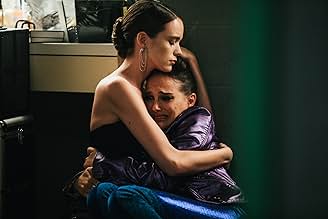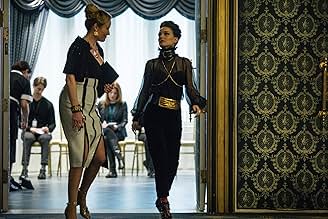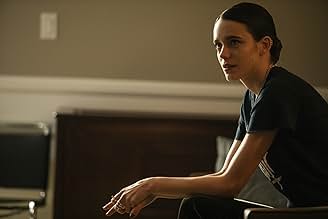CALIFICACIÓN DE IMDb
5.9/10
21 k
TU CALIFICACIÓN
Un conjunto de circunstancias inesperadas otorga un éxito inesperado a una estrella del pop.Un conjunto de circunstancias inesperadas otorga un éxito inesperado a una estrella del pop.Un conjunto de circunstancias inesperadas otorga un éxito inesperado a una estrella del pop.
- Premios
- 1 premio ganado y 11 nominaciones en total
Micheál Neeson
- The Musician
- (as Micheál Richardson)
Opiniones destacadas
I waited nearly 4 days to write this review/reaction because I genuinely wasn't sure how I felt after seeing Vox Lux. I'm not the first one to say this but it's quite the pairing with A Star is Born for what could be the best double feature of 2018, with both portraying such a vastly different take on rise to stardom. Much like other 2018 films Hereditary and 22 July, there are a few scenes in Vox Lux that I will never forget in that they are some of the most haunting and terrifying sequences I have ever seen on film. However, a film like 22 July had an easier plot to follow and a much more direct narrative, whereas Vox Lux is a dark interpretation of fame, and an interpretation that doesn't give the clearest clues as to how your supposed to feel after viewing. The performances are extraordinary, including yet another star-making turn from Raffey Cassidy and expectedly great turns from Jude Law and of course, Natalie Portman. Even if I'm not totally sure on how I feel about this film, I know that I want more films to be this bold and daring.
7.4/10
7.4/10
You will think Vox Lux would be about the perils of pop music. It starts off with a horrifying school shooting.
13 year old Celeste Montgomery (Raffey Cassidy) survives but is shot in the neck. At an event held to remember the victims, Celeste sings a song that she co-wrote with her older sister Ellie. It becomes a hit and Celeste gets picked up by a pop manager as she encounters instant fame.
The second part of the film concentrates on the adult Celeste (Natalie Portman) in 2017. She is a jaded unhinged pop diva. Cynical and hard as nails who has encountered booze, drugs and infamy. Celeste actually lost her vision in one eye while drinking cleaning fluids. She was involved in a multi million dollar lawsuit as she ran over a man and then was racially abusive towards him.
Celeste is about to start a tour to promote her new album. Her daughter Albertine (Raffey Cassidy) who has been raised by Ellie has recently lost her virginity. Celeste becomes unsteady and incoherent with booze, her daughter's sexual experience and a terrorist attack in Croatia which might be linked to her music. At one point it looks like Celeste is in no fit state to perform at the concert.
Vox Lux is deliberately episodic in structure and never joins up properly. The caustic narration by Willem Dafoe paints the movie as a warning of the corrosive effects of stardom. Celeste has long ceased to be a real person. The ending at a pop concert feels strangely muted, sudden and unsatisfying. Portman excels as Celeste just as Cassidy who plays dual roles but the film has nothing new to say.
13 year old Celeste Montgomery (Raffey Cassidy) survives but is shot in the neck. At an event held to remember the victims, Celeste sings a song that she co-wrote with her older sister Ellie. It becomes a hit and Celeste gets picked up by a pop manager as she encounters instant fame.
The second part of the film concentrates on the adult Celeste (Natalie Portman) in 2017. She is a jaded unhinged pop diva. Cynical and hard as nails who has encountered booze, drugs and infamy. Celeste actually lost her vision in one eye while drinking cleaning fluids. She was involved in a multi million dollar lawsuit as she ran over a man and then was racially abusive towards him.
Celeste is about to start a tour to promote her new album. Her daughter Albertine (Raffey Cassidy) who has been raised by Ellie has recently lost her virginity. Celeste becomes unsteady and incoherent with booze, her daughter's sexual experience and a terrorist attack in Croatia which might be linked to her music. At one point it looks like Celeste is in no fit state to perform at the concert.
Vox Lux is deliberately episodic in structure and never joins up properly. The caustic narration by Willem Dafoe paints the movie as a warning of the corrosive effects of stardom. Celeste has long ceased to be a real person. The ending at a pop concert feels strangely muted, sudden and unsatisfying. Portman excels as Celeste just as Cassidy who plays dual roles but the film has nothing new to say.
Especially when it comes through being a literal survivor of a despicable act - something I had no idea was going to happen, but sets quite the mood for the movie. We have different stages here and this might work as a good double bill to a documentary called "F... Fame". Well I don't think I have to spell the F word out for you to understand.
This works as criticism about how society views celebrities, fame and how this might change everyone involved. But it is quite slow in its pace and it is rather subtle in its message too. So while the performances might seem over the top at times, that does not go for the understanding of the movie or what it represents. Which might and will feel frustrating to watch for quite a few people - I'm split too on my verdict as you can see. Can't blame the actors who really do their best
This works as criticism about how society views celebrities, fame and how this might change everyone involved. But it is quite slow in its pace and it is rather subtle in its message too. So while the performances might seem over the top at times, that does not go for the understanding of the movie or what it represents. Which might and will feel frustrating to watch for quite a few people - I'm split too on my verdict as you can see. Can't blame the actors who really do their best
The sophomore effort from actor turned director (boy is this becoming a trend) Brady Corbet is dying to be inventive. The ambition to break conventions certainly plays as charming, but in the "look at the adorable child ad libbing this karaoke song" brand of charming. His experimenting begins early on with half of the end credits appearing over a long shot documenting a static scene of our protagonist bathing in the tragedy that will ignite the jumpy life events shown later. This is only a couple scenes deep into the movie, and it is also ineffective (partially because there's no apparent intended effect). Even so, this quirk remains the most forgivable of Corbet's decisions.
The voice of Willem Dafoe acts as a Virgil figure narrating Celeste's (Natalie Portman) fortunate misfortunes that led to her pop stardom. Celeste's crucible event occurs in a middle school classroom with musical notations plastered all over the walls. She sits attentive and diligent, eager to be trained by her clarinet-totting teacher. A boy adorned in glam mascara and eclipsed eyes enters, interrupting the roll call with more than words. What follows has been labelled as "birth" by a handy title screen demarcating the film's Act One. Divided into a prologue, two acts, and a finale, we're hardly treated to an essential utilization of the segmented narrative that filmmakers such as Lars von Trier have perfected.
Teenage Celeste is played by the rather mechanical Raffey Cassidy, who also plays (drum roll, kind sir) Celeste's daughter Albertine. This would initially appear as rather cunning way of allowing a substance-dependent adult Celeste to be maternally reminded of her squandered youth and innocence, however, the film makes no effort to support this surrealist reading. In fact it has the gumption to re-use yet another actress once the timeline shifts from 1999 to 2017. Eleanor, Celeste's older sister, is played by the less rigid Stacy Martin both as a teen and a 30 plus year old adult. To recap: Celeste gets to hop into a Natalie Portman body after 18 years, but Eleanor stays put. Much credit to Martin here for differentiating teen from adult in tastefully understated ways; the growth and grime that Celeste shoves her through shines through as adult Eleanor withstands verbal barrages one moment, then caresses her tormentor sister's head backstage in the next.
The young sisters compose a song to perform at a prayer vigil being held for the community torn asunder by the act of evil that has placed Celeste in a neck brace, an accessory that will change into scarfs and chokers as her fame blossoms. Eleanor deserves total writing credits, but Celeste is the one being wheeled out onto the church's stage. Local news recording the vigil cracks open the lid of possibilities, and the sisters have an anthem on their hands once they adjust the lyrics changing "the I's to we's". Immediately (and I mean immediately; no transition) the girls are led into a recording studio by The Manager (Jude Law). This is actually how he is credited, signifying how one-minded he acts in relation to Celeste. He uses all means necessary to build and maintain Celeste's pop royalty. Celeste's father appear once, and his face is obscured nailing in the reality of no parental nurture available to the budding star.
Her legal guardianship is ultimately pushed onto Eleanor, who will also take on that role for Celeste's own daughter. The film plants this as one of several consequences when one decides to sell their image. This act of self-marketing is compared curiously to radical nihilism with Dafoe decoding the film's intent over well executed camcorder montage footage implemented to advance the sister's slide into a vicious cycle of reliance upon one another. Celeste is nothing without Eleanor, completely unstable without her caring touch and intimate knowledge of her sister's greatest curse. Eleanor, however, is entirely supported financially by her hollow sister, and Albertine might be the only daughter she may ever have. All of Eleanor's talent and wisdom isn't stolen by Celeste, but given away freely. Reminiscent of the documentary Whitney revealing the relentless blood pact within the Houston family, the sister's entanglement carries the emotional heft of a film that otherwise blindly stabs at shocking imagery.
I will briefly mention an intriguing reading introduced by the narrator in the film's closing minutes. Without giving any detail, it's one of those scapegoat twilight revelations that can give Corbet an out for some of the issues I have expressed here. Strangely enough, I am grateful for this bit of spice for it allows the mind to wonder, combing through all the previous events. You're encouraged to view them with a surrealist lens, and some devious theory might pop up. This by no means corrects all the prior flaws, but it does allow you to imagine a better film within the otherwise static one that was ultimately delivered. Special mention to the pop songs crafted for Celeste by Sia, providing the vapid lyrical representation of a genre designed "to make people feel happy". What is unknown is that these hit-makers are far from happy.
The voice of Willem Dafoe acts as a Virgil figure narrating Celeste's (Natalie Portman) fortunate misfortunes that led to her pop stardom. Celeste's crucible event occurs in a middle school classroom with musical notations plastered all over the walls. She sits attentive and diligent, eager to be trained by her clarinet-totting teacher. A boy adorned in glam mascara and eclipsed eyes enters, interrupting the roll call with more than words. What follows has been labelled as "birth" by a handy title screen demarcating the film's Act One. Divided into a prologue, two acts, and a finale, we're hardly treated to an essential utilization of the segmented narrative that filmmakers such as Lars von Trier have perfected.
Teenage Celeste is played by the rather mechanical Raffey Cassidy, who also plays (drum roll, kind sir) Celeste's daughter Albertine. This would initially appear as rather cunning way of allowing a substance-dependent adult Celeste to be maternally reminded of her squandered youth and innocence, however, the film makes no effort to support this surrealist reading. In fact it has the gumption to re-use yet another actress once the timeline shifts from 1999 to 2017. Eleanor, Celeste's older sister, is played by the less rigid Stacy Martin both as a teen and a 30 plus year old adult. To recap: Celeste gets to hop into a Natalie Portman body after 18 years, but Eleanor stays put. Much credit to Martin here for differentiating teen from adult in tastefully understated ways; the growth and grime that Celeste shoves her through shines through as adult Eleanor withstands verbal barrages one moment, then caresses her tormentor sister's head backstage in the next.
The young sisters compose a song to perform at a prayer vigil being held for the community torn asunder by the act of evil that has placed Celeste in a neck brace, an accessory that will change into scarfs and chokers as her fame blossoms. Eleanor deserves total writing credits, but Celeste is the one being wheeled out onto the church's stage. Local news recording the vigil cracks open the lid of possibilities, and the sisters have an anthem on their hands once they adjust the lyrics changing "the I's to we's". Immediately (and I mean immediately; no transition) the girls are led into a recording studio by The Manager (Jude Law). This is actually how he is credited, signifying how one-minded he acts in relation to Celeste. He uses all means necessary to build and maintain Celeste's pop royalty. Celeste's father appear once, and his face is obscured nailing in the reality of no parental nurture available to the budding star.
Her legal guardianship is ultimately pushed onto Eleanor, who will also take on that role for Celeste's own daughter. The film plants this as one of several consequences when one decides to sell their image. This act of self-marketing is compared curiously to radical nihilism with Dafoe decoding the film's intent over well executed camcorder montage footage implemented to advance the sister's slide into a vicious cycle of reliance upon one another. Celeste is nothing without Eleanor, completely unstable without her caring touch and intimate knowledge of her sister's greatest curse. Eleanor, however, is entirely supported financially by her hollow sister, and Albertine might be the only daughter she may ever have. All of Eleanor's talent and wisdom isn't stolen by Celeste, but given away freely. Reminiscent of the documentary Whitney revealing the relentless blood pact within the Houston family, the sister's entanglement carries the emotional heft of a film that otherwise blindly stabs at shocking imagery.
I will briefly mention an intriguing reading introduced by the narrator in the film's closing minutes. Without giving any detail, it's one of those scapegoat twilight revelations that can give Corbet an out for some of the issues I have expressed here. Strangely enough, I am grateful for this bit of spice for it allows the mind to wonder, combing through all the previous events. You're encouraged to view them with a surrealist lens, and some devious theory might pop up. This by no means corrects all the prior flaws, but it does allow you to imagine a better film within the otherwise static one that was ultimately delivered. Special mention to the pop songs crafted for Celeste by Sia, providing the vapid lyrical representation of a genre designed "to make people feel happy". What is unknown is that these hit-makers are far from happy.
The subject is intriguing: an exploration of the current age, focused on artificial fame and mass shootings. When I heard about the basic plot of the film, I thought it would be the counterpart for A Star is Born and therefore I was expecting quite a different story. But no, the occasional emotional moments are blown apart by the unnecessary and overly cerebral narration, the plot goes all over the place, the split in four acts only shows how pretentious the whole thing is while it is basically saying nothing. And the ending? Having to watch Portman sing several pop songs was painful. Not because of her, but because of the awful music.
The thing is, Natalie Portman is fantastic! She portrays her character perfectly. Unfortunately, that's the only good (and short) part of the film. The young actress first gives me great hope, then she's replaced, Willem Dafoe's narrator is superfluous at best and Jude Law was wasted on his role. In the end it just feels like someone tried to do something very deep and intelligent without actually using their brain.
The thing is, Natalie Portman is fantastic! She portrays her character perfectly. Unfortunately, that's the only good (and short) part of the film. The young actress first gives me great hope, then she's replaced, Willem Dafoe's narrator is superfluous at best and Jude Law was wasted on his role. In the end it just feels like someone tried to do something very deep and intelligent without actually using their brain.
How Natalie Portman Created Chemistry in 'Vox Lux'
How Natalie Portman Created Chemistry in 'Vox Lux'
Natalie Portman and her Vox Lux co-star Raffey Cassidy discuss playing the same complex character and how they created chemistry with director Brady Corbet.
¿Sabías que…?
- TriviaNatalie Portman shot her part in only 10 days.
- ErroresDuring the sequence showing the road to Stockholm airport, multiple cars made after 2000 (the year that scene is supposed to be set) are visible.
- Citas
Young Celeste: That's what I love about pop music. I don't want people to have to think too hard. I just want them to feel good.
- Créditos curiososEnd credits roll downwards which only include post-production credits, score and music credits and business credits.
- Bandas sonorasMistress Mary
Traditional
Selecciones populares
Inicia sesión para calificar y agrega a la lista de videos para obtener recomendaciones personalizadas
- How long is Vox Lux?Con tecnología de Alexa
Detalles
Taquilla
- Presupuesto
- USD 11,000,000 (estimado)
- Total en EE. UU. y Canadá
- USD 727,119
- Fin de semana de estreno en EE. UU. y Canadá
- USD 155,714
- 9 dic 2018
- Total a nivel mundial
- USD 1,444,547
- Tiempo de ejecución
- 1h 54min(114 min)
- Color
- Relación de aspecto
- 1.66 : 1
Contribuir a esta página
Sugiere una edición o agrega el contenido que falta











































